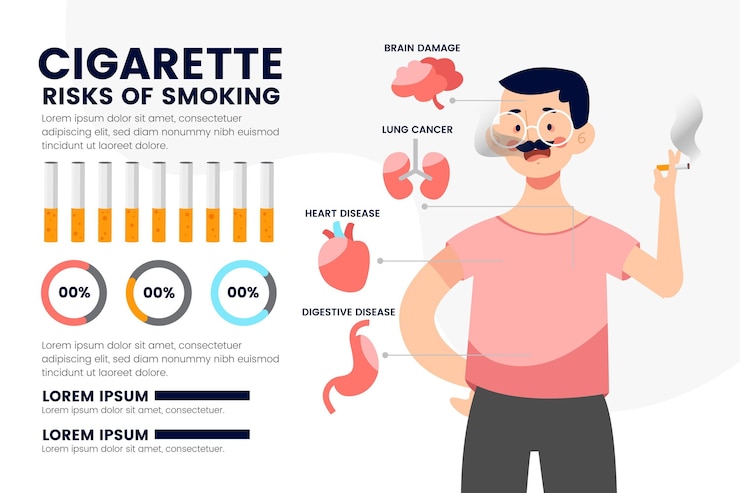The Effects of Smoking on Daily Life
Smoking is a well-known risk factor for numerous health issues, but its impact extends far beyond physical health. It influences various aspects of daily life, affecting everything from personal relationships to financial stability. This article explores the numerous ways smoking can affect an individual’s daily life.
1. Physical Health Consequences
The most immediate and severe impact of smoking is its detrimental effect on physical health. Smoking is linked to chronic conditions such as:
- Respiratory Issues: Smokers often experience chronic cough, asthma, and increased susceptibility to respiratory infections. This can limit physical activity and reduce overall quality of life.
- Cardiovascular Disease: Smoking increases the risk of heart disease, stroke, and hypertension. These conditions can lead to frequent doctor visits and hospitalizations, disrupting daily routines.
- Cancer: Smoking is the leading cause of lung cancer and is also associated with cancers of the mouth, throat, esophagus, and bladder. The fear of developing these conditions can lead to anxiety and stress.
2. Mental Health Impact
The link between smoking and mental health is complex. While some individuals smoke to cope with stress or anxiety, research shows that smoking can exacerbate mental health issues.
- Increased Anxiety and Depression: Smokers are more likely to experience symptoms of anxiety and depression. The nicotine in cigarettes may provide temporary relief, but it ultimately leads to mood swings and increased irritability.
- Dependence and Withdrawal: Nicotine is highly addictive, leading to dependence. Withdrawal symptoms can include irritability, difficulty concentrating, and mood swings, making it challenging to function in daily life.
3. Financial Burden
Smoking is an expensive habit. The cost of purchasing cigarettes can add up quickly, straining finances and diverting funds from essential needs or activities.
- Healthcare Costs: Smokers often face higher healthcare costs due to smoking-related illnesses. This includes regular medical check-ups, medications, and hospitalizations, further straining financial resources.
- Insurance Premiums: Smokers typically pay higher health insurance premiums due to the increased risk of health issues, adding to their financial burden.
4. Impact on Relationships
Smoking can affect personal and professional relationships in various ways:
- Social Stigma: Smokers may face social stigma, which can lead to feelings of isolation or judgment from non-smokers. This can affect social interactions and friendships.
- Impact on Family: Family members may be concerned about the smoker’s health and the secondhand smoke exposure, which can lead to tension in relationships. Parents who smoke may set a poor example for their children, increasing the likelihood of them smoking in the future.
- Professional Environment: In workplaces, smokers may have to take more breaks for smoking, which can affect productivity and relationships with coworkers. Additionally, the smell of smoke can be off-putting to others.
5. Lifestyle Limitations
Smoking can limit an individual’s lifestyle choices and opportunities:
- Travel Restrictions: Many places, such as restaurants, public transportation, and airports, have strict no-smoking policies. Smokers may find it challenging to enjoy outings without having to step outside to smoke.
- Physical Activity: Smoking can reduce stamina and overall fitness levels, making physical activities, such as exercise or playing sports, more difficult and less enjoyable.
- Hobbies and Interests: Some hobbies may become less accessible due to smoking. For instance, participating in activities that require endurance, such as hiking or biking, may become more challenging.
Conclusion
The effects of smoking permeate nearly every aspect of daily life, impacting physical health, mental well-being, finances, relationships, and lifestyle choices. Understanding these effects can motivate smokers to consider quitting and embracing a healthier lifestyle. For those who wish to quit, numerous resources, including counseling, support groups, and medications, are available to assist in this journey. The benefits of quitting smoking can lead to a healthier, happier, and more fulfilling daily life.


